Flawed modeling and overblown rhetoric drowning out scientific reality for the sake of money and power, climate experts say
There's no climate emergency. And the alarmist messaging pushed by global elites is purely political. That's what 1,609 scientists and informed professionals stated when they signed the Global Climate Intelligence Group's "World Climate Declaration."
"Climate science should be less political, while climate policies should be more scientific," the declaration begins. "Scientists should openly address uncertainties and exaggerations in their predictions of global warming, while politicians should dispassionately count the real costs as well as the imagined benefits of their policy measures."
The group is an independent "climate watchdog" founded in 2019 by emeritus professor of geophysics Guus Berkhout and Marcel Crok, a science journalist. According to its website, the organization's objective is to "generate knowledge and understanding of the causes and effects of climate change as well as the effects of climate policy." And it does so by objectively looking at the facts and engaging in scientific research into climate change and climate policy.
The declaration's signatories include Nobel laureates, theoretical physicists, meteorologists, professors, and environmental scientists worldwide. And when a select few were asked by The Epoch Times why they signed the declaration stating that the "climate emergency" is a farce, they all stated a variation of "because it's true."
"I signed the declaration because I believe the climate is no longer studied scientifically. Rather, it has become an item of faith," Haym Benaroya, a distinguished professor of mechanical and aerospace engineering at Rutgers University, told The Epoch Times.
"The earth has warmed about 2 degrees F since the end of the Little Ice Age around 1850, but that hardly constitutes an emergency—or even a crisis—since the planet has been warmer yet over the last few millennia," Ralph Alexander, a retired physicist and author of the website "Science Under Attack," told The Epoch Times.
"There is plenty of evidence that average temperatures were higher during the so-called Medieval Warm Period (centered around the year 1000), the Roman Warm Period (when grapes and citrus fruits were grown in now much colder Britain), and in the early Holocene (after the last regular Ice Age ended)."
The climate emergency is "fiction," he said unequivocally.
There were 1,609 scientists and informed professionals who signed the Global Climate Intelligence Group's “World Climate Declaration.”
The 'Climate Emergency'
Human activities and the resulting greenhouse gases are the cause of global warming, according to the Intergovernmental Panel on Climate Change (IPCC). Specifically, the IPCC says that in 1750, atmospheric carbon dioxide (CO2) concentrations were 280 parts per million (ppm), and today, the atmospheric CO2 concentrations are 420 ppm, which affects temperature.The IPCC is the U.N. body for assessing the "science related to climate change." It was created in 1988 by the World Meteorological Organization and the U.N. Environment Programme to help policymakers develop climate policies.
Edwin Berry, a theoretical physicist and certified consulting meteorologist, said that one of the IPCC's central theories is that natural CO2 has stayed constant at 280 ppm since 1750 and that human CO2 is responsible for the 140 ppm increase.
This IPCC theory makes human CO2 responsible for 33 percent of today's total CO2 level, he told The Epoch Times.
Consequently, to decrease temperatures, the IPCC says, we must reduce human-caused CO2—thus, the current push by lawmakers and climate activists to forcibly transition the world's transportation to electric vehicles, get rid of fossil fuels, and generally reduce all activities that contribute to human-caused CO2.
That entire premise, according to Mr. Berry, is problematic.
"The public perception of carbon dioxide is that it goes into the atmosphere and stays there," Mr. Berry said. "They think it just accumulates. But it doesn't."
He explained that when you look at the flow of carbon dioxide—"flow" meaning the carbon moving from one carbon reservoir to another, i.e., through photosynthesis, the eating of plants, and back out through respiration—a 140 ppm constant level requires a continual inflow of 40 ppm per year of carbon dioxide, because, according to the IPCC, carbon dioxide has a turnover time of 3.5 years (meaning carbon dioxide molecules stay in the atmosphere for about 3 1/2 years).
"A level of 280 ppm is twice that—80 ppm of inflow. Now, we're saying that the inflow of human carbon dioxide is one-third of the total. Even IPCC data says, 'No, human carbon dioxide inflow is about 5 percent to 7 percent of the total carbon dioxide inflow into the atmosphere,'" he said.
So, to make up for the lack of necessary human-caused carbon dioxide flowing into the atmosphere, the IPCC claims that instead of having a turnover time of 3.5 years, human CO2 stays in the atmosphere for hundreds or even thousands of years.
"[The IPCC is] saying that something is different about human carbon dioxide and that it can't flow as fast out of the atmosphere as natural carbon dioxide," Mr. Berry said. "Well, IPCC scientists—when they've gone through, what, billions of dollars?—should have asked a simple question: 'Is a human carbon dioxide molecule exactly identical to a natural carbon dioxide molecule?' And the answer is yes. Of course!
"Well, if human and natural CO2 molecules are identical, their outflow times must be identical. So, the whole idea where they say it's in there for hundreds, or thousands, of years, is wrong."
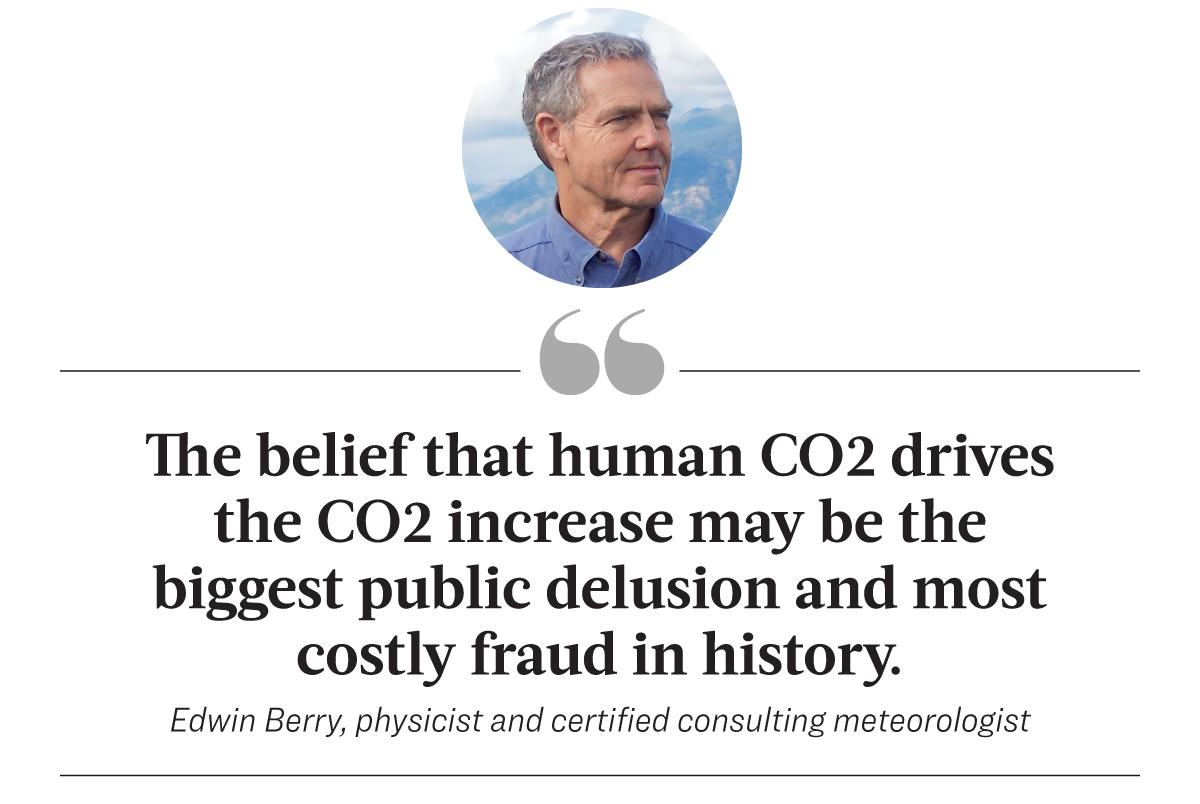
Mr. Berry said that means nature—not humans—caused the increase in CO2. And consequently, attempts to decrease human CO2 are pointless.
"The belief that human CO2 drives the CO2 increase may be the biggest public delusion and most costly fraud in history," Mr. Berry said.
He pointed out that in science, the scientific method says that you can't prove that a theory is 100 percent true—only that the data supports it—but you can prove that it's false. Providing an example, Mr. Berry said that Sir Isaac Newton's gravity law was the preeminent theory for a long time, but then Albert Einstein made a correction that disproved Newton's theory.
Smoke rises from a steel factory in Inner Mongolia, China, on Nov. 3, 2016.
"Go back to the scientific method: IPCC proposed a theory, and if we can prove it's wrong, we win. And I proved, in that case, their theory is wrong,” he said.
Mr. Berry took his research a step further and calculated the human carbon cycle using the IPCC's own carbon cycle data.
"The prediction from the same model doesn't give humans producing 140 ppm. It comes out closer to 30 ppm. Which essentially means the IPCC is wrong," he said.
He said that using the IPCC's data, nature is responsible for about 390 ppm of CO2, and humans are only responsible for about 30 ppm—not 140 ppm.
"Now, someone could ask, 'Well, is the IPCC data correct?' My answer is, 'I don't know.' But I don't have to know because IPCC has used this very data to deceive the world. I want to show that their logic is incorrect using their data," he said.
"The IPCC was not set up as a scientific organization."
Mr. Berry said that the IPCC doesn't engage in skepticism of its theories and, therefore, the scientific method that governs all science.
"They were set up as a political organization to specifically convince the public that carbon dioxide was causing problems," he said.
When asked why there's a push to declare a "climate emergency," Mr. Berry said it's all about money and control.
"That's the only real reason for it. There's no climate emergency," he said.
Mr. Berry makes all his research, and research and correspondence from colleagues trying to disprove his theories, available to the public.

Politics and Climate Models
Like Mr. Berry, Mr. Alexander says that science has become more political than scientific."It's simply not true that the Earth's climate is threatened. That claim is far more political than scientific," he said.
"Science is based on observational evidence, together with logic, to make sense of the evidence. Very little, if any, evidence exists that human emissions of CO2 cause rising temperatures. There is a correlation between the two, but the correlation isn't particularly strong: The Earth cooled, for example, from about 1940 to 1970, while the atmospheric CO2 level continued to go up. Computer climate models are all that connects global warming to CO2."
When asked why CO2 was singled out as the cause of the climate emergency, Mr. Alexander said it goes back to James Hansen, an astrophysicist and the head of NASA's Goddard Institute for Space Studies from 1981 to 2013, and an ardent environmentalist.
"Hansen developed one of the first computer climate models and began to make highly exaggerated predictions of future warming, none of which have come true," Mr. Alexander said. "This included testimony he gave at a 1986 Senate hearing, testimony considered to have sparked the subsequent anthropogenic global warming narrative."
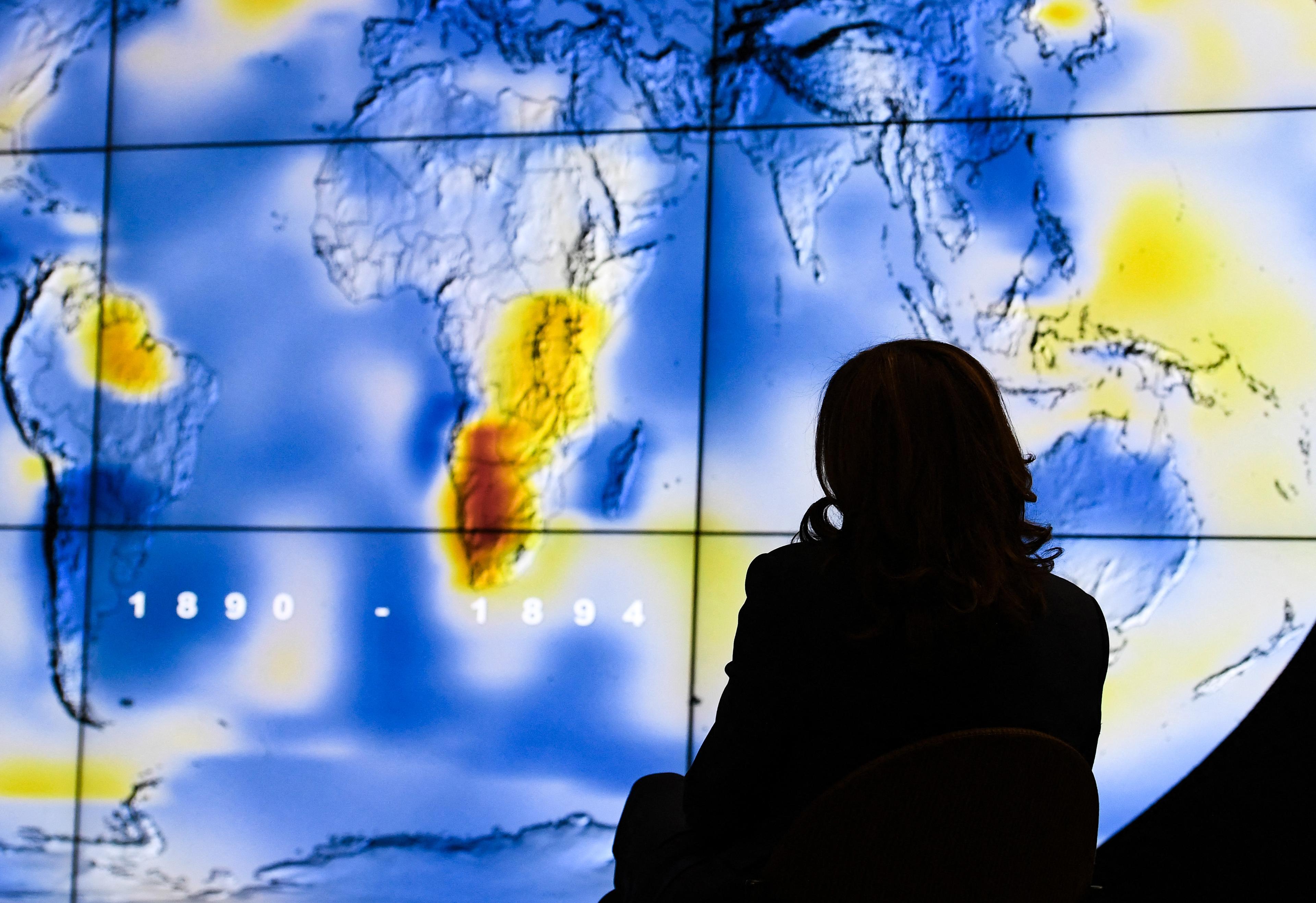
Vice President Kamala Harris looks at a hyperwall during a climate change discussion at the National Aeronautics and Space Administration (NASA) Goddard Space Flight Center in Greenbelt, Md., on Nov. 5, 2021. (Olivier Douliery/AFP via Getty Images)
Despite his predictions failing to come to fruition, Mr. Hansen's efforts contributed to the founding of the IPCC, Mr. Alexander said.
"Although ostensibly the IPCC is a scientific body, the findings of its scientists are frequently distorted and hyped by the government and NGO bureaucrats who dominate the organization," he said. "The bureaucrats have played a major role in exaggerating the scientific conclusions of successive IPCC reports and escalating the rhetoric of its official pronouncements. Hence, the U.N. secretary-general's recent proclamations about a 'boiling' earth."
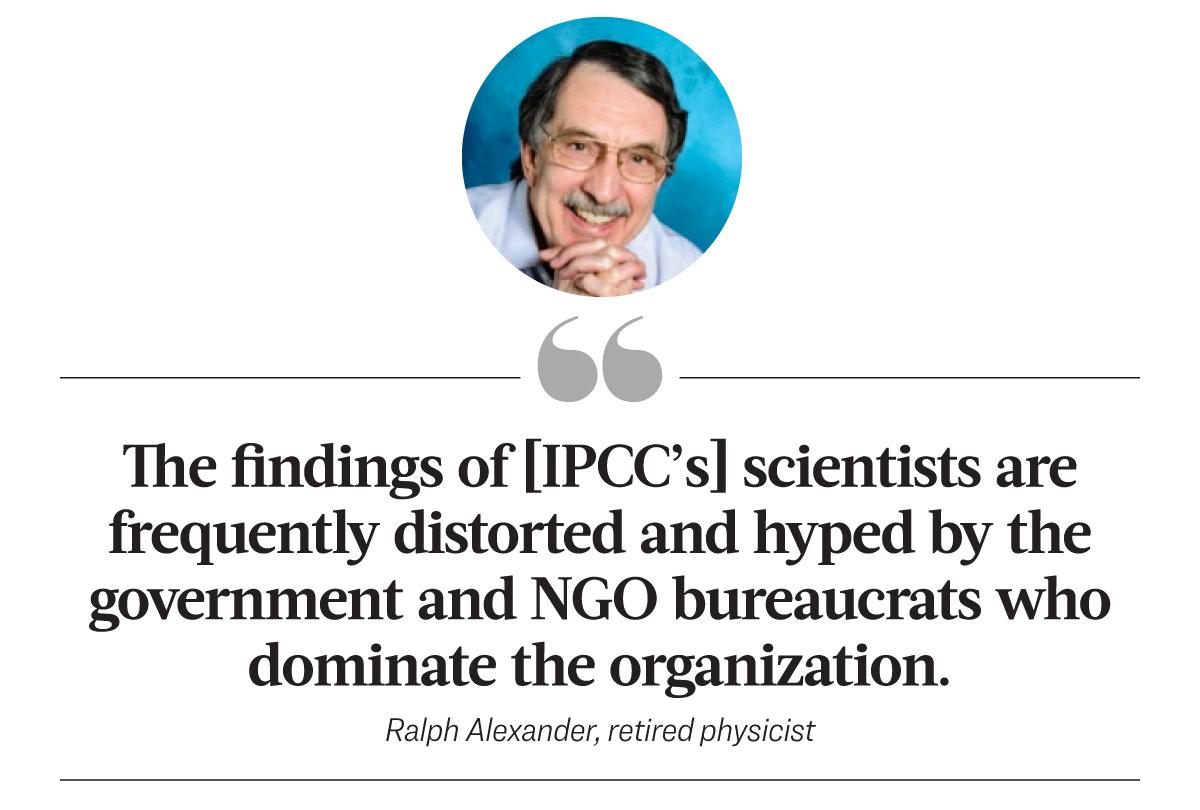
On July 27, Secretary General António Guterres said, “Climate change is here. It is terrifying. And it is just the beginning. The era of global warming has ended; the era of global boiling has arrived. The air is unbreathable. The heat is unbearable. And the level of fossil fuel profits and climate inaction is unacceptable.”
Mr. Alexander said an honest answer to what's causing Earth's warming is, "We just don't know right now," but that doesn't mean scientists are short of ideas.
"The chances of CO2 being the number one culprit are very slim. CO2 undoubtedly contributes, but there are several natural cycles that most likely do, too," he said. "These include solar variability and ocean cycles, both ignored in climate models—because we don't know how to incorporate them—or represented poorly. While climate activists will tell you otherwise, climate science is still in its infancy, and there is a great deal we don't yet understand about our climate."
He said one example is a recent research paper that estimated that changes in the sun's output could explain 70 to 80 percent of global warming. Research such as that doesn't gain much traction because the IPCC is committed to the idea that human CO2 is the cause of global warming.
As further criticism, Mr. Alexander said John Christy, a climatologist and professor of atmospheric science at the University of Alabama in Huntsville and the director of the Earth System Science Center, has clearly demonstrated that climate models exaggerate short-term future warming by two to three times.
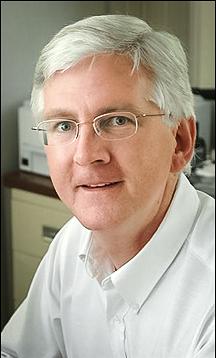
To find more accurate measurements, Mr. Christy and Roy Spencer, a climatologist, former NASA scientist, and now a principal research scientist at the University of Alabama in Huntsville, developed a global temperature data set from microwave satellite observations.
They started their project in 1989, analyzed data going back to 1979, and found that, in general, since 1979, the Earth's temperature has increased steadily by 0.23 degrees Fahrenheit every 10 years, according to global satellite data, Mr. Spencer said on his website.
As for why climate models are so inaccurate, Mr. Alexander said: "Computer simulations are only as reliable as the assumptions that the computer model is built on, and there are many assumptions that go into climate models. Assumptions about processes we don't fully understand require approximations.
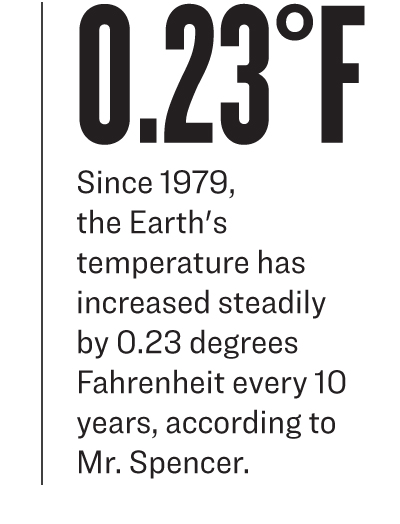 "All these large-scale and small-scale approximations are incorporated in the model in the form of adjustable numerical parameters—often termed ‘fudge factors’ by scientists and engineers. The famous mathematician John von Neumann once said, 'With four [adjustable] parameters, I can fit an elephant, and with five, I can make him wiggle his trunk.'"
"All these large-scale and small-scale approximations are incorporated in the model in the form of adjustable numerical parameters—often termed ‘fudge factors’ by scientists and engineers. The famous mathematician John von Neumann once said, 'With four [adjustable] parameters, I can fit an elephant, and with five, I can make him wiggle his trunk.'"Mr. Neumann's saying means that people shouldn't be impressed when a complex model fits a data set because, with enough parameters, you can fit any data set.
Mr. Benaroya echoed Mr. Alexander's criticism but took it further regarding climate modeling.
"All climate model predictions have been wrong," Mr. Benaroya told The Epoch Times. "It is important to understand that a computational model of the atmosphere is inherently inaccurate. This is not the fault of the researchers.
"It is due to the enormous complexity of the climate—chemistry; fluid mechanics; heat transfer; effects of solar radiation; effects of the Earth; the modeling of the oceans, which can hold tremendous amounts of heat; and the effects of the clouds. No mathematical model put in a form to be analyzed by a computer can account for all these effects. Many of these effects are not fully understood. Also not understood is how these effects are coupled to each other."

Mr. Benaroya said that in addition to not fully understanding the complexity of the climate, what data is available is incomplete or, in some cases, manipulated to fit a narrative.
"There have been several reports about the rigging of the data to assure outcomes that point to the coming climate disaster," he said. "All the predictions have been wrong. I want the climate to be nonpolitical in science. Policies should be based on science. Policies is where the politics come in, not the facts."
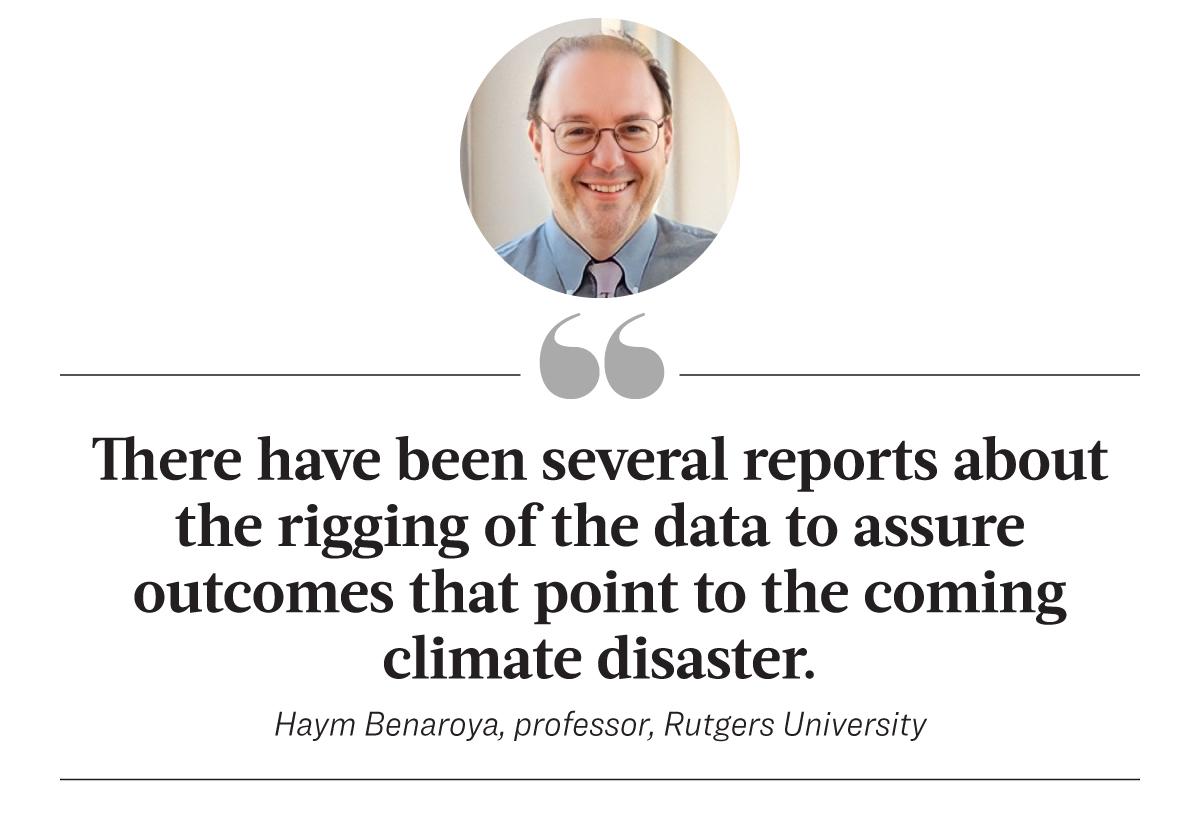
As for why there's a push to declare a "climate emergency," Mr. Benaroya said it's about "power and money, but also larger political forces.”
“[Some] may hate big industry, big oil, and technology. Maybe some hate the West or capitalism. All these likely play a role," he said.
Mr. Alexander agreed that it's about power and money.
"In the beginning, the key phrase was simply 'global warming.' When that aroused little interest, someone came up with the clever idea of substituting the phrase 'climate change,' which was highly effective for a while, since the Earth's climate is constantly changing regardless of what the temperature is doing,” he said.
"Then, when nonbelievers began to ignore the message again, the mantra became 'climate crisis.' That escalated into the current 'climate emergency,' hoping that the term 'emergency' would actually stir people into action and persuade them to back net-zero CO2 and other measures.
"Another element is the far left's desire to overthrow the whole capitalist system, which they regard as evil and the source of all society's problems. For them, a climate crisis or emergency is a convenient vehicle to achieve their aims."
As for the United Nations' push for net-zero CO2 by 2050, Mr. Alexander said: "It's a complete waste of time and resources and may well impoverish many Western economies. China and India are not playing along in any case, which makes the whole effort meaningless."
World leaders and delegates gather at a summit to address climate change, at the United Nations Headquarters in New York on Sept. 23, 2019.
Poverty and Human Health
Calvin Beisner, an expert in environmental ethics and the founder and national spokesperson for the Cornwall Alliance for the Stewardship of Creation, agrees that nature, not humans, causes most climate change. He said that the push to decrease CO2 by transitioning from fossil fuels to renewable energy is trapping people in extreme poverty worldwide."I have testified to committees of Congress that the amount of global warming that is attributable to human activity is so slight as to have little impact on human well-being," Mr. Beisner, who testified before committees of the U.S. Senate and House, told The Epoch Times.
"But the attempt to reduce that warming by forcing a rapid transition from coal, oil, and natural gas to wind and solar and other so-called renewable energy sources would slow, stop, or reverse the time out of poverty for people worldwide. And poverty is a far greater risk to human health and life than anything related to climate."
Mr. Beisner explained that when people have wealth, they can thrive in "any climate from the Arctic Circle to the Sahara Desert to the Brazilian rainforest." But when people try to survive on a few dollars daily, they can't thrive in "even the best tropical paradise."
He said that economic development, owing partly to cheap fossil fuels, has allowed the populace to thrive in countries such as the United States as well as in Europe. But now, with the United Nations’ push to net-zero CO2 by 2050, developed countries are telling countries in Sub-Saharan Africa and parts of Asia and Latin America "to forego the use of abundant, affordable, reliable energy from fossil fuels that lifted the West out of poverty and restrict themselves to the use of diffuse, expensive, unreliable, wind and solar, and thus, slowing their rise out of poverty.”
(Left) Smoke rises from the steel mill HKM Huettenwerke Krupp Mannesmann GmbH in Duisburg, Germany, on Jan. 6, 2017. (Right) Wind turbines operate at a wind farm near Whitewater, Calif., on Feb. 22, 2023.
"This is the West forcing its ideology on the rest," Mr. Beisner said. "And it is ethically unconscionable. It's ironic that so many environmentalists who embrace progressive or woke ideologies, and therefore tend to condemn colonialism of the past, now embrace this Neo-colonial movement."
Like Mr. Alexander, Mr. Beisner pointed back to Mr. Christy's data on the Earth's global temperature and said: "We've come out of an ice age, or we are coming out of a little ice age that ran roughly 1350 to 1850.
"I agree with what their satellite data shows, which is that the rate of increase in global average temperature has been about 0.13 degrees Celsius per decade since the satellite records began in 1979. That would be about 1.3 degrees per century. Certainly, nothing that is going to cause a disaster for mankind."
He said that there's a push to declare a climate emergency because "politicians with poorly formed consciences find it easy to justify the growth of government power by appealing to fear of crisis or emergency, and the leading politicians in America today are far more hungry for power than they are committed to the good of the populace."
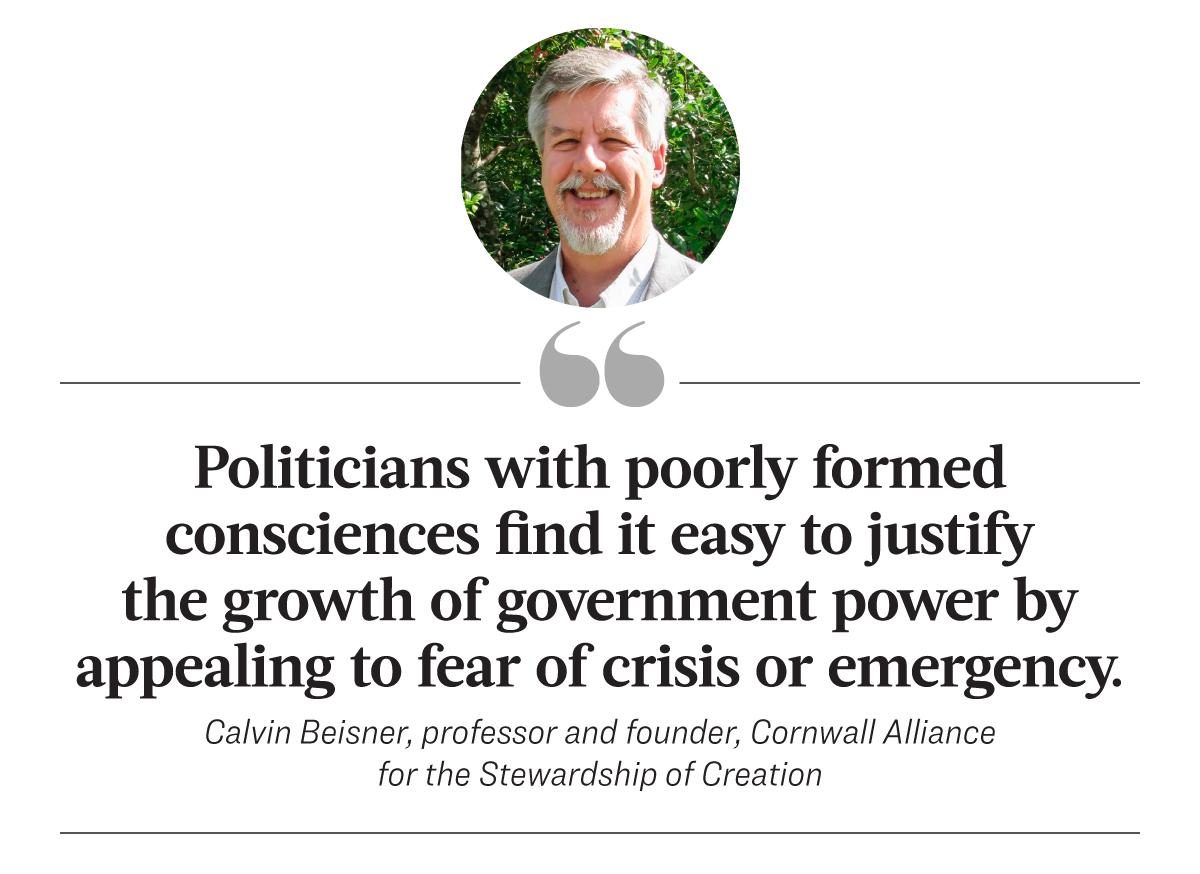
Weather and Alarmist Rhetoric
Richard Lindzen, an emeritus professor of meteorology and the Alfred P. Sloan professor at the Massachusetts Institute of Technology, told The Epoch Times that the argument that there's an "existential threat" to the earth from increasing temperatures is a "purely political statement," since even the IPCC doesn't claim there's an existential threat.Instead, the IPCC references scientists and climate activists who claim there’s an existential threat, but has never made this claim itself, Mr. Lindzen said.
"The [climate] models haven't even suggested it," he said. "And it arises from the fact that this was originally a political issue. And the politicians involved in it worry that their hysteria isn't catching the best. They keep shifting from the global mean temperature to extreme weather. And you know, they keep saying, 'Get worried, get worried! Panic!' But science never suggested that [there's a climate emergency]."
Mr. Lindzen said that even if those in power believed that there was an existential threat to the climate, the policies they've adopted to mitigate such a threat don't make sense.
"If you believe CO2 is the villain and that we're facing an existential threat, net zero is the wrong policy. All the things done—electric cars are ridiculous. Look at how CO2 is behaving. We've spent trillions so far, and it hasn't changed a bit. It's continuing to go up at the same rate,” he said.

"The only purpose of the policies is to make the society poorer. And if you're poorer, you're less resilient. So if you believe CO2 is an existential threat and your policies are doing nothing to prevent it but are making you less resilient, one would have to ask, are you a pathological sadist?"
Mr. Lindzen said it's important to remember that the Earth is spherical, and the major climate change during the Last Glacial Maximum, about 20,000 years ago, didn't come from the greenhouse effect (meaning heat trapped close to the Earth's surface). Instead, it occurred due to the temperature difference between the tropics and the poles.
He explained that the wave-like motions traveling from west to east on weather maps, are convective motions that carry heat from the tropics to the poles.
"[Convective motions] try to establish a certain temperature distribution before they stop pumping," he said, explaining that the process is similar to heating a pot of water. The motion of the boiling water is the temperature trying to eliminate the temperature difference between the heating at the bottom of the pot and the water on top.
Similarly, when the sun hits the Earth's surface, it hits it head-on at the equator but barely skims the surface at the poles. Thus, the Earth undertakes a similar action to the temperature in the pot of water and, essentially, tries to equalize the heat between the equator and the poles by distributing the temperature in waves. And that's what we understand as weather.
An iceberg was released by a glacier along the Scoresby Sound Fjord, Greenland, on Aug. 15, 2023. (Olivier Morin/AFP via Getty Images)
"If you have no ice, the surface will bring you to 20 degrees different centigrade [68 degrees F], which you had 50 [million] years ago. If you have a glacial maximum, it'll bring you to a temperature difference that's 20 degrees greater than today. But these have nothing to do with the greenhouse process," Mr. Lindzen said.
"No evidence exists that the tropics and pole temperature differences are changing. And that's what caused major climate change [in the past]. Whatever change we've seen is minimal and is due largely to what the tropics are doing."
Mr. Lindzen, like the others, said the push to declare a "climate emergency" isn't about science but money and power.
"You have to wonder about politicians, whether it's a form of psychosis," he said. "Maybe it's neuroses, sometimes. But I think the attraction of political power is not something normal people find irresistible."
Joe Bastardi, co-chief meteorologist at WeatherBell, a weather forecasting service, says the weather constantly searches for balance, or "dynamic equilibrium." But unlike Mr. Lindzen, Mr. Bastardi argues that we've seen a slight increase in temperature due to geothermal increases.
"In the geological timescale, we're in what you would refer to as a climate optimum, not a climate emergency," Mr. Bastardi told The Epoch Times. "There were several times when we saw this kind of warming in the past, and life thrived on the planet. I suspect the reason that past warming occurred is likely because the ocean warmed. And the oceans warmed, I think, because of increasing underwater volcanic activity."
He said a perfect example of his theory is the 2022 eruption of the underwater volcano Hunga Tonga, which sent the equivalent of 58,000 swimming pools worth of water vapor into the stratosphere and accounts for warmer-than-average weather in some areas during 2023.
Ash rising from a Hunga Tonga undersea volcanic eruption in Tonga on March 19, 2009.
"Increases in the geothermal activity precede the increase in sea surface temperatures," he said. "Water vapor is the number one greenhouse gas. So if the oceans warm, you put more water vapor into the air. Consequently, you get the warming, and most of the warming is occurring away from the equator. And that's another clue because it's occurring where it's coldest and driest, and that's where water vapor has the greatest influence on temperature."
Returning to the idea of dynamic equilibrium, Mr. Bastardi explained that the atmosphere "fights back" when temperature changes occur.
"I mean, the biggest dirty little secret—and only a meteorologist who follows hurricanes would understand this—is that the trapping hotspots that [climate activists] were pushing in the 1990s never showed up over the tropics. They're over the Arctic, which is a very different response. That means that the atmosphere is fighting back," he said.
Mr. Bastardi forecasts that it'll be "very, very cold and very, very stormy this winter.”
“If you do get warming in the Arctic, [cooling] is a natural response to the warming. These big El Niños have to go off when you build up the ocean heat. When they go off, I mean it's beautiful. You can see the rise in the temperatures as a step-up function directly correlated to the big El Niños," he said.
He said if the temperature rises due to geothermal activity, the increase is not man-made, and the push for net-zero CO2 by 2050 is pointless.
"My judgment is that these people are pushing [a climate emergency] for a completely different reason than climate and weather," he said.
High school students hold placards and shout slogans as they take part in the Fridays for Future movement on climate change in Athens, Greece, on Nov. 29, 2019.
Questioning the Narrative
"Climate is a composition of a whole lot of stuff that affects climate," Larry Bell, an architect known for designing and crafting inhabitable buildings for space, and an endowed professor at the University of Houston, told The Epoch Times. "It's tough to model because we don't know all the proportions of different variables influencing [climate]."Some variables operate over hundreds, thousands, tens of thousands of years, and have to do with our planet's position in the solar system, or position in the galaxy, and ocean changes that have nothing to do with the atmosphere—El Niño and La Niña, the effect of solar changes (which are magnetic changes that affect astrophysics)—so it's really complex, and a lot of what we call climate science is very specialized. People study one thing or another, but the studies aren't connected."
He said geologists, for example, look at long-term trends that reflect on rocks and geological formations, while mathematicians and astrophysicists look at climate differently. And none of the different disciplines can say they have it ultimately figured out because it's "devilishly complicated."
He said there were four decades of cooling following World War II, even though war-time efforts resulted in additional CO2 in the atmosphere.
"So, the notion that there's some simple correlation between carbon dioxide and climate change is a convenient contrivance," he said.
Mr. Bell said he first got interested in climate change when Fred Singer, the founder of the U.S. Weather Satellite Service, visited him at his office in early 1979 and showed him that satellite weather data wasn't working as some had predicted.
An illustration showing the La Niña (L) and El Niño (R) events. (U.S. Dept of Commerce National Oceanic and Atmospheric Administration National Weather Service)
"He said weather satellites weren't showing the 'hotspot it'd predicted over the tropical troposphere,'" Mr. Bell said.
"The climate models were predicting that the atmosphere warms first and then the surface, and they predicted because of that a hotspot would be detectable over the equator, and they weren't finding it."
Mr. Bell said he didn't overthink climate change at the time, but as the years passed and he heard more about it, he started questioning the constantly changing narrative.
At first, there was concern that "the glaciers are coming" and global cooling would be a problem, but then 10 years later, the fears had flipped to "global warming," he said.
"Timothy Wirth, who helped organize a Senate hearing on global warming in Washington, famously told a magazine that they scheduled the meeting for what was typically the hottest day of the year, and the night before the meeting, they went in and opened all the windows and turned off the air conditioning,” he said.
"And James Hansen … heading the Institute for Space Studies, which was part of NASA, he came out and said, 'The planet is on fire, and we're causing it!' And this was part of the narrative because it was a prelude to pushing all this green energy stuff."
Mr. Bell said the claim that 97 percent of scientists agree that humans are causing global warming isn’t truthful.
He said scientists agree that the climate is changing, but "there's no such emergency whatsoever."
"The climate has been warming in fits and starts since the last little ice age. And it may continue. But if you look at images of New York, at the shoreline there of the Statue of Liberty, the water hasn't risen. The sea level is not appreciably different than it was years ago. So that's anecdotal, but it's real. Your eyes can see it," he said.
Mr. Bell said another narrative pushed by climate alarmists is that the weather is getting more violent in the form of hurricanes and other weather-related disasters.
"All they have to do is look at the records. No, it's not worse! Hurricane seasons were much worse in the '30s. But they look in terms of fatalities or damage, and more people live on the coast now than there were then," he said.
People walk by damaged property in the aftermath of Hurricane Ian in Bonita Springs, Fla., on Sept. 29, 2022.
Mr. Bastardi confirmed Mr. Bell's take: "The kinetic energy of hurricanes has been decreasing, and you can see that with the ACE [Accumulated Cyclone Energy] index—it's been lowering.
"What [climate alarmists] do is they're sort of predators in that they realize the average person doesn't have time to think and examine every little detail, especially in this day and age where people live paycheck to paycheck and are worried about their jobs.
"The everyday person isn't looking at the fact that there's 100 times more property value in the way, and inflation has gone through the roof, so that when a hurricane now is a place like Fort Myers or hits a place like Myrtle Beach, it's going to do much, much more damage than it did before."
When asked what concerns him most about the current narratives being pushed by climate alarmists, Mr. Bell answered: "I care about how climate hysteria, and how misinformation, drives policy. And these policies are driving our foundational bedrock policies that determine our economic well-being. They determine our national defense mastery—we won't run a Navy on ethanol. We're not going to run an Air Force on extension cords. It's just absolutely insane. People think of climate as science. No, it's not. It's the big lever of government. It's big globalism. And it ain't favoring the U.S.
"There's absolutely nothing more impacting, nothing more effective, I think, than leveraging the climate scare."
https://www.theepochtimes.com/article/meteorologists-scientists-explain-why-there-is-no-climate-emergency-5489139?ea_src=ca-frontpage&ea_med=top-news-us-politics-2-large-0

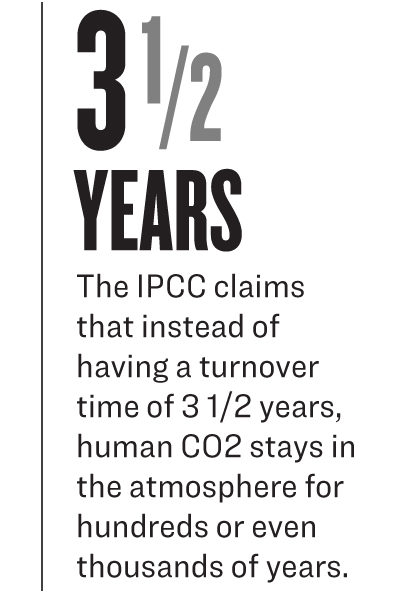

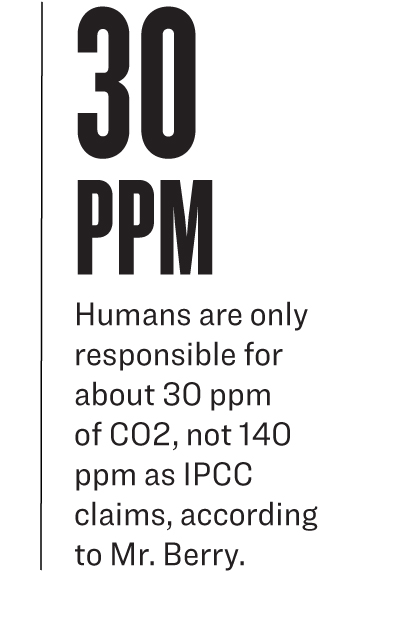











No comments:
Post a Comment